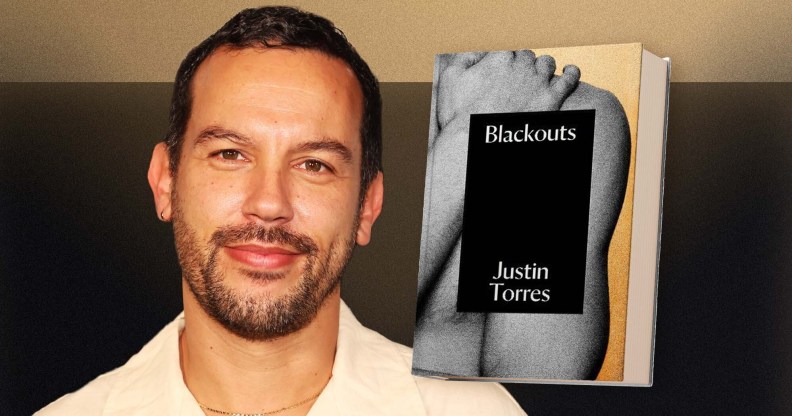Justin Torres says queer novel Blackouts is the ‘ultimate provocation’ to the book-banning right

Blackouts author Justin Torres talks to PinkNews about his latest release. (Getty/Farrar, Straus and Giroux)
Author Justin Torres blurs the line between historical fiction and reality in his highly-anticipated new book, Blackouts.
The Puerto Rican-American novelist made his name with his semi-autobiographical coming-of-age tale We the Animals in 2011, which was eventually adapted into an award-winning film in 2018.
Now, Torres is returning with a genre-defying, intergenerational narrative that preserves the memory of lesbian activist Jan Gay and pays homage to the power of passing down queer stories through oral storytelling.
In Blackouts, we meet a young man and narrator who enters the amorphous space known as The Palace, where he encounters a dying man called Juan Gay. The two strike up a dialogue which uncovers the radical history behind the 1941 pathological study on sexuality, Sex Variants: A Study in Homosexual Patterns.
As the pair delve into the past, bonded by their shared identity as gay men, they “trade stories – moments of joy and oblivion – and resurrect lost loves, lives, mothers, fathers, minor heroes”.

The inspiration for this unique take on unwritten queer history came more than 12 years ago, when Torres stumbled across Sex Variants in an unassuming donation box while working for the Modern Times Bookstore in San Francisco, he tells PinkNews.
The medical study includes testimony from LGBTQ+ people, most prominently from New York – and it immediately hooked Torres.
“It was real people from a broad spectrum of the New York underground queer scene,” he says. “Each voice in the testimony sounded so different from the other. It was compelling, fascinating.
“Their concerns, their ideas about queerness, how they relate it to their own sexuality, the slang they use, all of it was so different and yet familiar to the dynamics of the contemporary queer scene.
“Reading [about] the way people I thought I would never get to meet, or talk to, lived and described their lives, it felt like stumbling upon ancestors.
“You have to separate all the pathological, medical, experimental s**t, then underneath you get these vibrant glimpses of lives that were never meant to be documented or lives that had disappeared.”
Blackouts‘ narrator acts almost as a proxy for Torres himself, “engaging with the past and also the frustrations with how little there is.”
Torres adds: “It’s called Blackouts and part of the experience of the text is that you’re constantly interrupted and frustrated. That desire for a clear linear narrative and a clear sense of queer history is not fulfilled, because that is the experience looking back at our history.”
Reading between the lines of history is a practice LGBTQ+ people are familiar with, whether it’s decoding Anne Lister’s diaries, reclaiming Emily Dickinson’s poetry, or digging into Rock Hudson’s secret gay Hollywood life and Little Richard’s long struggle with his sexuality.
“Certain things were definitely covered up or erased,” Torres says, “especially stuff around gender and gender identity.
“It’s always going to be ambiguous because the terms that we use in the present day, they didn’t exist. It’s never going to be straightforward. It’s never going to be direct.”
Nowhere does this hold truer than the source material for Sex Variants.
Although the study is attributed to George William Henry, the true researcher behind the project was Jan Gay, whose life has unfairly fallen through the cracks of history.

“There are a couple of books that mention Jan Gay briefly,” Torres says. “And I thought: ‘OK, great, this is where I start, let me just find out everything else about her’, then there wasn’t anything. It’s very hard to trace her life and yet this entire study was her idea.
“She had been researching lesbian lives, travelled to Europe, gone to Oxford, Berlin, London, Paris and New York, obviously, and had taken down all these testimonies, modelled after [German sexologist] Magnus Hirschfeld.
“She had high hopes for the final result. Then, of course, they almost entirely erased her. There’s one brief mention of her in the introduction, a single sentence and that’s it. She hated it. She wrote an angry letter. She was crushed by the way it turned out.”
This passing down of queer history in the style of “Socratic dialogue” is the bread and butter of the book, which seeks to do justice to LGBTQ+ lives so thoughtlessly erased, as Gay’s was.
In writing Blackouts, Torres also discovered the stark warnings we must heed in the modern day, especially when it comes to the medicalisation of the transgender community.
“One of the crushing things to be living through is watching the exact same script happening with the trans community and the obsession with finding disease or perversion,” he says, pointing to the historical mental pathologising of homosexuality.
“It’s frustrating and heart-breaking but, knowing history, there’s a certain hope that you can derive: We’ve overcome these attacks in the past, we’ll overcome this contemporary narrative around trans identity.
“It took a long time and a lot of effort, but it happened and it will happen again.”
Attacks on trans rights are coming in tandem with a growing spate of LGBTQ+ book bans across the US, and, given the central theme of his novel, the irony of queer literature being censored is not lost on Torres.
“I had no sense that the Right was going to choose book banning as the new front in the culture war. [Blackouts is] the ultimate provocation.
“There are so many penises in this book and descriptions of sex, hand-drawn gynaecological illustrations, a lot that would infuriate these people but it wasn’t meant as a provocation.
“My biggest hope is that people go out, and are curious and learn everything they can. Our [queer] culture has produced so much over the decades and centuries.
“It does slip away if it’s not constantly referred to, cited and made relevant again.”
Blackouts, by Justin Torres, is available to buy here.
How did this story make you feel?

